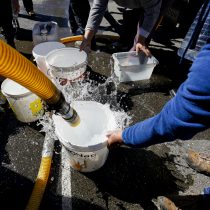
For the peoples who originally inhabited these territories, water is a living being, with which affection is spoken, expressed and expected in this way to deserve its benefits. Water is the vital sap, the “blood of the earth” that allows the repetition of life and is a bond of union, a reason for joint work and a creator of reciprocities. Thus, the Aymaras regard water as a humanized collective good that accompanies existence and subsistence, fundamental to food and medicine. The Mapuche, for their part, understand that water is a sacred element, fundamental in their worldview, giver of life and life in itself.
In our society, water is necessary for subsistence; human beings require daily, for optimal development, 100 liters of water (drink, hygiene, food sovereignty, etc.). However, with regard to human access to drinking water, analyzing the information obtained from the last Census valid in Chile (year 2017), it is obtained that 383,204 homes lack drinking water in our country. In addition, it is noted that, in the rural world, 47.2% of the population supplies wells, rivers, slopes or cistern trucks.
In relation to climate and meteorology, since 2010, the occurrence of a phenomenon, called by some, the “megasequie”, has been observed in Chile. The territory between the regions of Coquimbo and La Araucanía (including Valparaiso) has experienced a rainfall deficit of about 30%. This occurs in the warmest decade of the last 100 years, increasing the water deficit through the evaporation of lakes, reservoirs and crops. During the second half of 2020, the Directorate General of Waters, using its powers, made the declaration of 14 water scarcity zones in the country, five of them in the Valparaiso region. So far in 2021, four declarations have been made, one of them in the Valparaiso region (province of Petorca).
Despite the complex scenario outlined in the preceding paragraphs, and the essentials of water for human subsistence, regulatory status in our country departs from enshrining a human right to water as such. In Chile, water is considered a consumer good, which can be appropriated by individuals, through exploitation rights, with the sole limitations of considering the material availability of the resource in ecosystems and the non-affectation of legally constituted third-party rights.
In this line, both the Civil Code (Article 589) and the Water Code (Article 5) provide that water is national goods for public use. However, they regulate how individuals can take advantage of them, giving their owner the use, enjoyment and disposition, along with all the means necessary to exercise it. For many, these provisions ensure the right to property of water and its use for productive purposes, relegating to the background other uses, such as humans.
In other countries, at the constitutional level, the human right to water is guaranteed. For example, the Constitution of the United Mexican States, in article 4; Costa Rica’s Political Constitution, in article 50; The Political Constitution of the State of Bolivia in article 373. Recently, a ruling of the Supreme Court (Rol No72.198-2020), motivated by provisions of international instruments recognizes as an inherent right to the person, access to safe drinking water. This is because these instruments, in developing the concept of “dignified life”, understand access to water within it.
In a context of drought and climate change, in which the model of economic development is privileged in the use of water, it is essential to establish a human right to water that can be exercised in the same way and without arbitrariness by all the inhabitants of the territory, where the State also guarantees its availability, access and quality. Water is necessary for human subsistence, it is elementary to promote food sovereignty, it is required for hygiene and sanitation. Water is life, and it needs to be guaranteed and enshrined as a human right in the new constitutional text.
The content poured into this opinion column is the sole responsibility of its author, and does not necessarily reflect the editorial line or position of El Mostrador.





